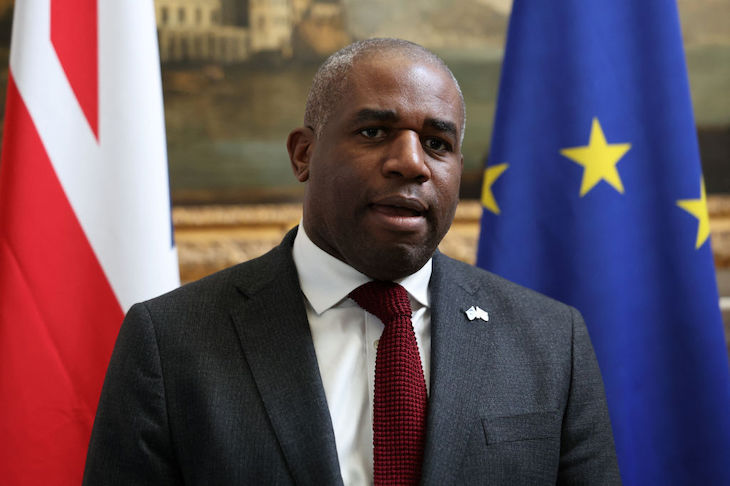The audacity of it! The hypocrisy! First, Nicola Sturgeon says yesterday in a TV interview that she’s ‘not that into flags’ and tells us all to ‘calm down about flags’. Then, later in the day, her successor as first minister, Humza Yousaf, chimes in with one of those creepy walking-while-talking videos in which he informs us that ‘Hate wrapped in a Saltire is still hate.’ Scotland’s flag ‘belongs to everyone’, he mawkishly intones.
This, of course, comes in the context of Operation Raise the Colours, the flag raising campaign seen by some as a robust exercise in patriotism but criticised by others as intimidatory and racially motivated. The movement has spread to Scotland, with Saltires appearing on lampposts in towns and cities from Glasgow to Aberdeen.
Sturgeon and Yousaf are vexed by this: how dare those whose politics they fundamentally disagree with appropriate Scotland’s national symbols for their cause.
That Sturgeon and Yousaf can come out with this stuff without even a hint of self-awareness is astonishing. Yousaf was not long ago leading Saltire-festooned marches imploring people to ‘believe in Scotland’ – the implication being that those Scots who oppose his nationalist politics lack faith in the nation. How very inclusive and welcoming.
Sturgeon, meanwhile, spent eight years as first minister stoking a national identity culture war most Scots never wanted. Starting in the build-up to the 2014 referendum, the SNP cynically split Scotland into two opposing camps: virtuous and culturally enlightened nationalists who are welcome to embrace the Saltire, and unionists who must be socially excluded from their Scottishness until they see the light and move to the culturally superior camp.
It is no surprise to find the two first ministers now putting forward childish arguments about a particular flag representing particular values rather than questioning the political context they helped create, whereby assertions of national identity substitute for actual progress. Politics in liberal democracies used to revolve around broad economic policy issues, with the progressive left aiming to protect the less well-off from the vagaries of the market while using the power of the state to more fairly distribute resources. Thanks to politicians like Sturgeon and Yousaf, politics has become a shallow expression of identity. Why bother with policy complexity and trade-offs when you can simply assert your identity while peppering your speech with the word ‘progressive’?
At no point have these politicians questioned whether actively working to create a divide that directly ties politics with identity, and which is therefore reminiscent of a sectarian rather than traditional political split, might be socially detrimental. And where were the warnings about politicising the Saltire or inciting hatred when journalists were being abused and business owners threatened under their watch?
Sturgeon and Yousaf are instinctively tribal in outlook, though seemingly completely oblivious to it. ‘Othering’ comes so naturally as to be automatic. In Sturgeon’s case, this was unintentionally shown in her recent appearance on The Rest is Politics podcast, during which she described Scots as always wanting to be seen as working class even if they’ve done well for themselves, as opposed to the English who apparently all aspire to be seen as middle-class. Has she never been to Yorkshire, or Liverpool, or Newcastle, or countless other places south of Berwick?
Is it too much to ask Scotland’s former first ministers to consider the consequences of their own creation?
That reflex, to eradicate individual character in favour of a single national character, and with a sprinkling of prejudice, was telling.
In his book, On Identity, American political scientist Francis Fukuyama discusses how liberal democracies are premised on the equal recognition of the dignity of each citizen as individuals. Dignity has been ‘democratised,’ he writes, but with a warning that identity politics in liberal democracies has begun to ‘reconverge with the collective and illiberal forms of identity such as nation and religion’.
Sturgeon and Yousaf have been part of that illiberal force that has removed individuality and reasserted national identity as a political driver.
Although they talk about being concerned by the rise of the far-right, it seems more likely their real concern is losing the political advantage gained, in an age of identity politics, of exclusive ownership of Scotland’s most prominent national symbol.
Is it too much to ask Scotland’s former first ministers to consider the consequences of their own creation before lecturing us about flags? Politics by national identity culture war is far from progressive. If politicians like Sturgeon and Yousaf could take the time to understand that, then we might actually reach a point where the Saltire is politically neutral and once again ‘belongs to everyone’.









Comments